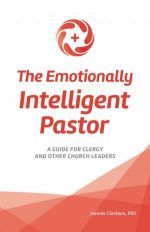If you are a pastor, you know that people are your “business.” We’re not the CEOs of widget factories or the purveyors of goods and services. Instead, we have a heart like the apostle Paul’s: “My dear children, for whom I am again in the pains of childbirth until Christ is formed in you” (Galatians 4:19).
That heart is intensely relational. Paul’s analogy of his ministry to the “pains of childbirth” is apt. Pastoring brings the great joy of bringing new Christian life into the world. However, it involves great pain too. Serving others in this way is not easy, but it is worth it.
Because people are our “business,” and because our “business” is both worthwhile and difficult, we need to be wise in the ways of people. The Bible is filled with wisdom in this regard. So is the discipline of psychology, which has coined the term emotional intelligence to describe it. In The Emotionally Healthy Pastor, Jeannie Clarkson brings the Bible and psychology into fruitful dialogue.
Clarkson is a Christian psychologist. Her doctoral dissertation researched, in the words of its title, “Pastoral Burnout: The Results of a Study Examining the Relationships of Emotional Intelligence and Performance-Based Self-Esteem with Burnout among Pastors.” She founded and operates Christian Care Connection, a counseling service in and around Toledo, Ohio.
Clarkson defines emotional intelligence as “the ability to (1) understand the ways people (including you) feel and react, and (2) use this knowledge to wisely avoid or smartly solve relational problems” (p. 36). She goes on to demonstrate why emotional intelligence is crucial to pastoral ministry and explain how to develop greater emotional intelligence.
Her book utilizes the framework of Daniel Goleman’s Emotional Intelligence, grounding it in Scripture and showing its applicability to pastoral ministry. In addition to real-life anecdotes from her own experience and that of others, she uses the fictional experiences of three pastors—megachurch Jim, midsize church Bill, and smaller church Susan—to illustrate the kinds of scenarios where emotional intelligence can improve pastoral health and effectiveness.
For Clarkson, emotional intelligence consists of four elements (p. 42):
- Personal Insight: Highly emotionally intelligent [EI] pastors possess a better understanding of their own emotions than do others.
- Personal Mastery: High EI pastors control and regulate their own emotions and reactions better than others.
- Relational Insight: EI-savvy pastors read, understand, and empathize with the emotions and reactions of other people better than most.
- Relational Mastery: Pastors with high emotional intelligence are better at emotional reasoning and more skilled at effective, persuasive communication than others.
While some researchers lean toward understanding emotional intelligence as an inborn trait, Clarkson, like Goleman, leans toward interpreting it as a developed skill.
She devotes most of The Emotionally Intelligent Pastor to explaining what each of the four elements is and how to develop better skillfulness with it. A chart on page 40 helpfully summarizes her advice:
Sixteen Skills and Habits of Emotionally Intelligent Pastors
| Personal Insight | Personal Mastery | Relational Insight | Relational Mastery |
| Monitoring your emotions | Resetting your mind-set | Listening attentively | Building trust |
| Tuning in to self-talk | Managing emotional triggers | Tuning in to others | Managing expectations |
| Identifying emotional triggers | Communicating directly | Knowing your team | Empowering others |
| Asking for feedback | Maintaining your passion | Learning the landscape | Managing conflict |
Although Clarkson’s overall framework is based on Goleman’s, her book is more helpful to pastors than his for two reasons: First, it cuts quickly to the basic elements of emotional intelligence and how to develop them without getting lost in the research details. Second, it applies emotional intelligence solely to pastoral ministry.
I conclude with a statement that Clarkson calls “the big promise of emotional intelligence”: “Greater emotional intelligence leads to reduced stress and increased influence.” If in your current ministry, you’re experiencing the opposite—increased stress and reduced influence—I encourage you to read The Emotionally Intelligent Pastor. I think it will help.
Book Reviewed
Jeannie Clarkson, The Emotionally Intelligent Pastor: A Guide for Clergy and Other Church Leaders (Indianapolis, IN: Wesleyan Publishing House, 2019).
P.S. If you like my review, please click “Helpful” on my Amazon review page.


One thought on “The Emotionally Intelligent Pastor | Book Review”